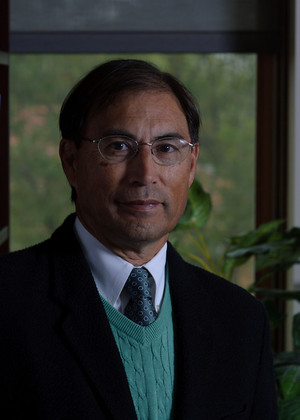Dr. George Watson dies after battle with cancer

Dr. George Watson, Chadron State College professor of justice studies, died Saturday after a battle with pancreatic cancer. A memorial service is set for Friday, July 2, at 10 a.m. in the ballroom of the CSC Student Center.
Watson, 60, played a major role in the incredible growth of the Justice Studies Department and accumulated a long list of honors and achievements since arriving at CSC in the fall of 1976.
Among his many honors, he was CSC’s first recipient of the Nebraska State College System’s Teaching Excellence Award in 1987.
When Watson was hired at CSC more than three decades ago, there was only one other justice studies professor and 15 students enrolled as majors in the program. The program grew to more than 170 majors during the next 15 years as the number of faculty remained the same. Now, with four full-time faculty members and an adjunct professor, the program continues to be one of CSC’s flagship programs.
Watson, who taught courses in criminal law, criminal procedures, evidence and the department’s honors program, took pride that the program had gained a solid reputation with its rigorous standards and stability.
“To build a program, you have to do a heck of a lot more than just teach,” he once said. “In addition to teaching, you have to provide opportunities for students and build relationships with people in the field.”
In addition to his success in the classroom, Watson initiated and administered a successful study abroad program. In all, he participated in 31 foreign study tours, most of them to London. Each spring, he led from 25 to 30 students on the trips, which featured stops at many high profile points of London’s legal system.
Watson conducted numerous seminars for area law enforcement personnel and attracted many high profile speakers of law enforcement and legal studies to CSC. He was awarded the Nebraska Department of Justice’s Outstanding Law Enforcement Teaching Award in 1994 and was the Police Chiefs Association of Nebraska Outstanding Law Enforcement Educator in 1993.
Watson’s expertise gained him prominent positions in statewide agencies and organizations.
Watson served two terms on the Nebraska Police Standards Advisory Council, including service as chairman. He also was appointed a member of the Nebraska Crime Commission. Both positions were appointments by Nebraska governors. In 2007, he was recognized as one of 30 members of the 2007 Class of Fellows selected by the Nebraska Bar Foundation.
He also conducted research and presentations throughout his career, including a series of annual speeches at CSC about the year’s most prominent U.S. Supreme Court cases. Among his published works is a 179-page book on the legal history of Chadron and Dawes County. “Prairie Justice – A legal history of Dawes County” was published in 1985.
Watson also worked as an attorney at the Chadron firm of Crites, Shaffer , Connealy & Watson, and was highly involved in the community. Before coming to Chadron, he practiced law in Lincoln for $25,000 more than his starting salary of $10,800 at CSC.
He also served as chairman of the Museum of the Fur Trade’s board of directors, and was a member of boards for the Nebraska Children and Families Foundation and the Nebraska Children’s Home Society.
Watson obtained a juris doctorate from the University of Nebraska College of Law and completed undergraduate studies at Hastings College, where he was an outstanding wide receiver for the football team and a sprinter in track and field. He also completed post-doctoral studies at the University of Exeter and Harvard Law School.
Watson’s battle with cancer inspired former students to create Team George, a scholarship fund-raising effort during the annual Colter Run at Chadron’s Fur Trade Days. More information about that effort may be found at www.teamgeorge2010.wordpress.com.
Watson is survived by his wife, Kit, and three children.
Category: Campus News

